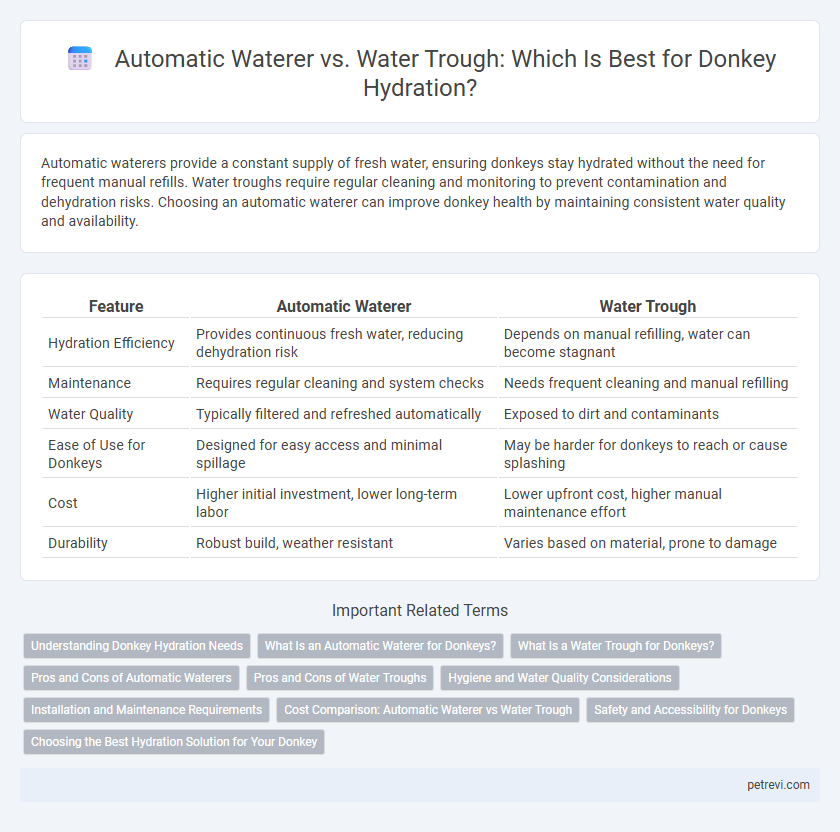Automatic waterers provide a constant supply of fresh water, ensuring donkeys stay hydrated without the need for frequent manual refills. Water troughs require regular cleaning and monitoring to prevent contamination and dehydration risks. Choosing an automatic waterer can improve donkey health by maintaining consistent water quality and availability.
Table of Comparison
| Feature | Automatic Waterer | Water Trough |
|---|---|---|
| Hydration Efficiency | Provides continuous fresh water, reducing dehydration risk | Depends on manual refilling, water can become stagnant |
| Maintenance | Requires regular cleaning and system checks | Needs frequent cleaning and manual refilling |
| Water Quality | Typically filtered and refreshed automatically | Exposed to dirt and contaminants |
| Ease of Use for Donkeys | Designed for easy access and minimal spillage | May be harder for donkeys to reach or cause splashing |
| Cost | Higher initial investment, lower long-term labor | Lower upfront cost, higher manual maintenance effort |
| Durability | Robust build, weather resistant | Varies based on material, prone to damage |
Understanding Donkey Hydration Needs
Donkeys require consistent access to clean, fresh water to maintain optimal hydration, as their physiology is adapted to arid environments but still demands sufficient intake for health and digestion. Automatic waterers provide a continuous water supply, reducing contamination risks and ensuring donkeys drink regularly, while water troughs require frequent manual refilling and cleaning to prevent algae and bacteria buildup. Understanding these hydration needs is crucial for selecting a watering system that supports donkey well-being, especially in varying climates and herd sizes.
What Is an Automatic Waterer for Donkeys?
An automatic waterer for donkeys is a device designed to provide a consistent and clean supply of fresh water without manual refilling, utilizing sensors or float valves to maintain water levels. These systems reduce water contamination and ensure donkeys have access to hydration 24/7, which is crucial for their health and well-being. Compared to traditional water troughs, automatic waterers minimize spillage and waste, promoting more efficient water management in donkey care.
What Is a Water Trough for Donkeys?
A water trough for donkeys is a large, open container designed to hold clean, fresh water accessible to multiple animals simultaneously, promoting consistent hydration. Typically made from durable materials like metal, plastic, or concrete, water troughs provide donkeys with ample space to drink comfortably, minimizing spillage and contamination. Proper maintenance and regular cleaning of the trough are essential to ensure water quality, reducing the risk of waterborne diseases and supporting overall donkey health.
Pros and Cons of Automatic Waterers
Automatic waterers provide consistent access to fresh water, reducing the risk of dehydration in donkeys by encouraging regular drinking. These devices require less daily maintenance compared to water troughs but can be prone to mechanical failures or freezing in cold climates, potentially disrupting water supply. While automatic waterers ensure hygiene by minimizing contamination, they often involve higher initial installation costs and may demand regular inspections to maintain proper functionality.
Pros and Cons of Water Troughs
Water troughs for donkeys provide a large and accessible water source, promoting natural drinking behavior and reducing the risk of spillage compared to automatic waterers. They require regular manual cleaning and refilling, which can be labor-intensive and may lead to contamination if neglected. Their open design allows for easier monitoring of water levels but increases the risk of dirt and debris entering the water.
Hygiene and Water Quality Considerations
Automatic waterers provide continuous fresh water flow, reducing bacterial growth and algae buildup, which enhances hygiene for donkeys. Water troughs require frequent cleaning to prevent contamination and stagnant water that can degrade water quality. Proper maintenance of either system is crucial, but automatic waterers often offer superior water quality control by ensuring regular water turnover.
Installation and Maintenance Requirements
Automatic waterers require professional installation involving plumbing connections to ensure consistent water flow, whereas water troughs need minimal setup, often just placement and filling. Maintenance for automatic waterers includes regular checks of valves and cleaning to prevent clogs, while water troughs demand frequent manual cleaning and refilling to maintain water quality. Both options must be monitored to prevent contamination and ensure the donkey has continuous access to fresh hydration.
Cost Comparison: Automatic Waterer vs Water Trough
Automatic waterers for donkeys typically involve higher initial installation costs, averaging between $300 and $700, but they reduce labor expenses by providing a continuous water supply with minimal maintenance. Traditional water troughs cost around $50 to $150 upfront but require frequent manual refilling and cleaning, increasing ongoing labor and water wastage costs over time. Evaluating total expenses over a year shows automatic waterers may be more economical when factoring in labor savings and improved water hygiene.
Safety and Accessibility for Donkeys
Automatic waterers offer continuous access to clean water, reducing contamination risk and ensuring consistent hydration for donkeys, which is vital for their health. Water troughs can be more accessible for donkeys due to their natural drinking posture but require frequent cleaning to prevent bacterial buildup and water stagnation. Safety concerns favor automatic waterers that minimize spillage and prevent injuries from sharp trough edges or contaminants in standing water.
Choosing the Best Hydration Solution for Your Donkey
Automatic waterers provide a consistent, fresh water supply, reducing the risk of contamination and encouraging regular hydration for donkeys. Water troughs require manual refilling and cleaning, which can lead to stagnant water and potential health issues if neglected. Selecting the best hydration solution depends on factors like convenience, water quality maintenance, and the donkey's drinking habits to ensure optimal health and hydration.
Automatic Waterer vs Water Trough for Donkey Hydration Infographic

 petrevi.com
petrevi.com